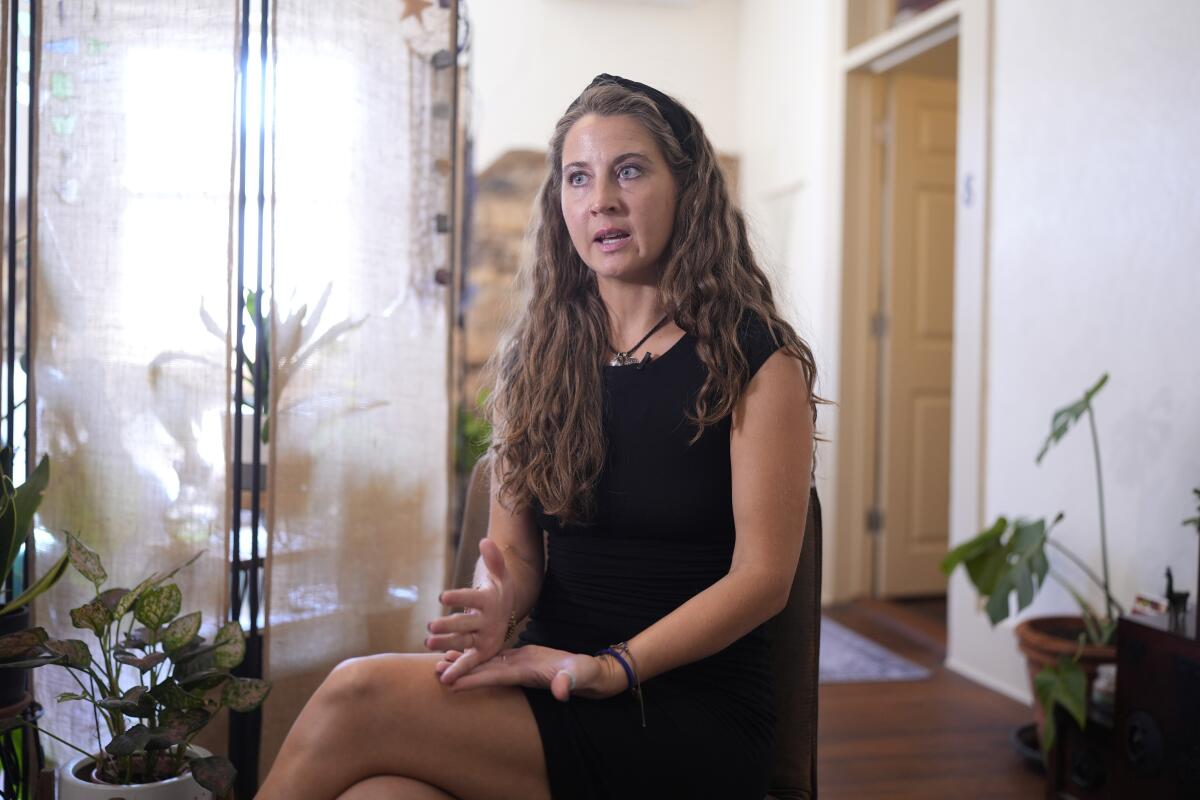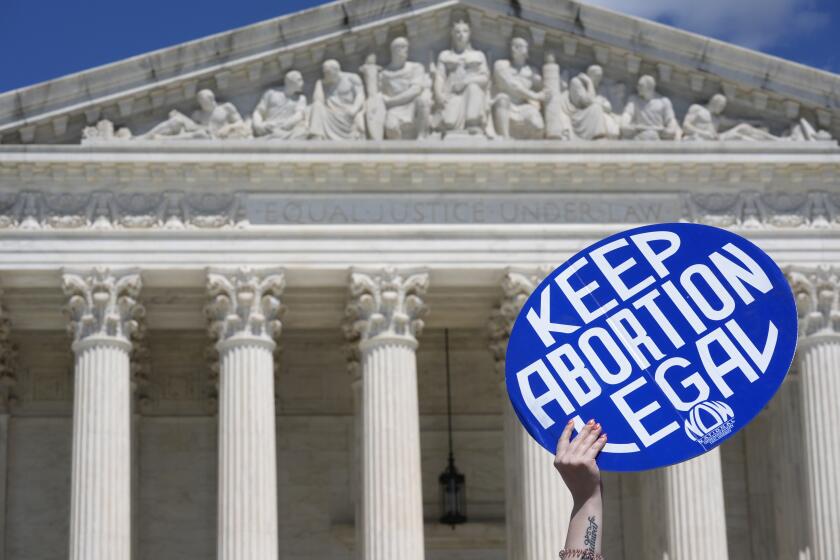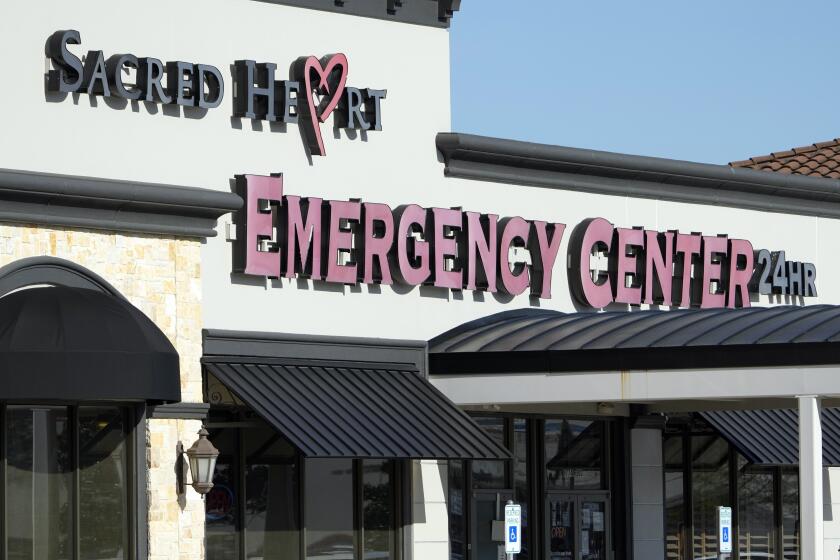Dozens of pregnant women, some bleeding or in labor, being turned away from ERs despite federal law

- Share via
WASHINGTON — Bleeding and in pain, Kyleigh Thurman didn’t know her doomed pregnancy could kill her.
Emergency room doctors at Ascension Seton Williamson in Texas handed her a pamphlet on miscarriage and told her to “let nature take its course” before discharging her without treatment for her ectopic pregnancy.
When the 25-year-old returned three days later, still bleeding, doctors finally agreed to give her an injection to end the pregnancy. It was too late. The fertilized egg growing on Thurman’s fallopian tube ruptured it, destroying part of her reproductive system.
That’s according to a complaint Thurman and the Center for Reproductive Rights filed last week asking the government to investigate whether the hospital violated federal law when staff failed to treat her initially in February 2023.
“I was left to flail,” Thurman said. “It was nothing short of being misled.”
The Biden administration says hospitals must offer abortions when needed to save a woman’s life, despite state bans enacted after the Supreme Court overturned the constitutional right to an abortion more than two years ago. Texas is challenging that guidance and, earlier this summer, the Supreme Court declined to resolve the issue.
More than 100 pregnant patients in medical distress who sought help from emergency rooms were turned away or negligently treated since 2022, an Associated Press analysis of federal hospital investigations found.
A growing number of women say they’ve tried to end their pregnancies by taking herbs, drinking alcohol or hitting themselves in the abdomen, study finds.
Two women — one in Florida and one in Texas — were left to miscarry in public restrooms. In Arkansas, a woman went into septic shock and her fetus died after an emergency room sent her home. At least four other women with ectopic pregnancies had trouble getting treatment, including one in California who needed a blood transfusion after she sat for nine hours in an emergency waiting room.
Abortion bans complicate risky pregnancy care
In Texas, where doctors face up to 99 years of prison if convicted of performing an illegal abortion, medical and legal experts say the law is complicating decision-making around emergency pregnancy care.
Although the state law says termination of ectopic pregnancies isn’t considered abortion, the draconian penalties scare Texas doctors from treating those patients, the Center for Reproductive Rights argues.
“As fearful as hospitals and doctors are of running afoul of these state abortion bans, they also need to be concerned about running afoul of federal law,” said Marc Hearron, a center attorney. Hospitals face a federal investigation, hefty penalties and threats to their Medicare funding if they violate the federal law.
The organization filed complaints last week with the Centers for Medicare and Medicaid Service alleging that different Texas emergency rooms failed to treat two patients, including Thurman, with ectopic pregnancies.
One complaint says Kelsie Norris-De La Cruz, 25, lost a fallopian tube and most of an ovary after an Arlington, Texas, hospital sent her home without treating her ectopic pregnancy, even after a doctor said discharge was “not in her best interest.”
The Biden administration is telling emergency room doctors they must perform emergency abortions when necessary to save a pregnant woman’s health.
“The doctors knew I needed an abortion, but these bans are making it nearly impossible to get basic emergency healthcare,” she said in a statement. “I’m filing this complaint because women like me deserve justice and accountability from those that hurt us.”
Conclusively diagnosing an ectopic pregnancy can be difficult. Doctors cannot always find the pregnancy’s location on an ultrasound, three doctors consulted for this article explained. Hormone levels, bleeding, a positive pregnancy test and an ultrasound of an empty uterus all indicate an ectopic pregnancy.
“You can’t be 100% — that’s the tricky part,” said Kate Arnold, an OB-GYN in Washington. “They’re literally time bombs. It’s a pregnancy growing in this thing that can only grow so much.”
Texas Right to Life Director John Seago said state law protects doctors from prosecution for terminating ectopic pregnancies, even if a doctor “makes a mistake” in diagnosing it.
“Sending a woman back home is completely unnecessary, completely dangerous,” Seago said.
But the state law has “absolutely” made doctors afraid of treating pregnant patients, said Hannah Gordon, an emergency medicine physician who worked in a Dallas hospital until last year.
She recalled a patient with signs of an ectopic pregnancy at her Dallas emergency room. Because OB-GYNs said they couldn’t definitively diagnose the problem, they waited to end the pregnancy until she came back the next day.
“It left a bad taste in my mouth,” said Gordon, who left Texas hoping to become pregnant and worried about the care she’d receive there.
‘Oh my God, I’m dying’
When Thurman returned to Ascension Seton Williamson a third time, her OB-GYN told her she’d need surgery to remove the fallopian tube, which had ruptured. Thurman, still heavily bleeding, balked. Losing the tube would jeopardize her fertility.
Her doctor told her she risked death if she waited any longer.
“She came in and she’s like, you’re either going to have to have a blood transfusion, or you’re going to have to have surgery or you’re going to bleed out,” Thurman said, through tears. “That’s when I just kind of was like, ‘Oh my God, I’m, I’m dying.’ ”
The hospital declined to comment on Thurman’s case, but said in a statement it “is committed to providing high-quality care to all who seek our services.”
In Florida, a 15-week pregnant woman leaked amniotic fluid for an hour in Broward Health Coral Springs’ emergency wait room, according to federal documents. An ultrasound revealed the patient had no amniotic fluid surrounding the fetus, a dangerous situation that can cause serious infection.
The woman miscarried in a public bathroom that day, after the emergency room doctor listed her condition as “improved” and discharged her, without consulting the hospital’s OB-GYN.
Emergency crews rushed her to another hospital, where she was placed on a ventilator and discharged after six days.
Abortions after 15 weeks were banned in Florida at the time. Broward Health Coral Springs’ obstetrics medical director told an investigator that inducing labor for anyone who presents with pre-viable premature rupture of membranes is “the standard of care, has been a while, regardless of heartbeat, due to the risk to the mother.”
The hospital declined comment.
In another Florida case, a doctor admitted state law had complicated emergency pregnancy care.
“Because of the new laws ... staff cannot intervene unless there is a danger to the patient’s health,” a doctor at Memorial Regional Hospital in Hollywood, Fla., told an investigator who was probing the hospital’s failure to offer an abortion to a woman whose water broke at 15 weeks, well before the fetus could survive.
Troubles extend beyond abortion ban states
Serious violations that jeopardized a woman’s or her fetus’ health occurred in states with and without abortion bans, the AP’s review found.
Two short-staffed hospitals — in Idaho and Washington — admitted to investigators they routinely directed pregnant patients to other hospitals.
A pregnant patient at a Bakersfield emergency room was quickly triaged, but staff failed to realize the urgency of her condition, a uterine rupture. The delay, an investigator concluded, may have contributed to the baby’s death.
Doctors at emergency rooms in California, Nebraska, Arkansas and South Carolina failed to check for fetal heartbeats or discharged patients who were in active labor, leaving them to deliver at home or in ambulances, according to the documents.
Nursing and doctor shortages, trouble staffing ultrasounds around-the-clock and new abortion laws are making the emergency room a dangerous place for pregnant people, warned Dara Kass, an emergency medicine doctor and former U.S. Health and Human Services official.
“It is increasingly less safe to be pregnant and seeking emergency care in an emergency department,” she said.
Seitz writes for the Associated Press.
More to Read
Sign up for Essential California
The most important California stories and recommendations in your inbox every morning.
You may occasionally receive promotional content from the Los Angeles Times.












